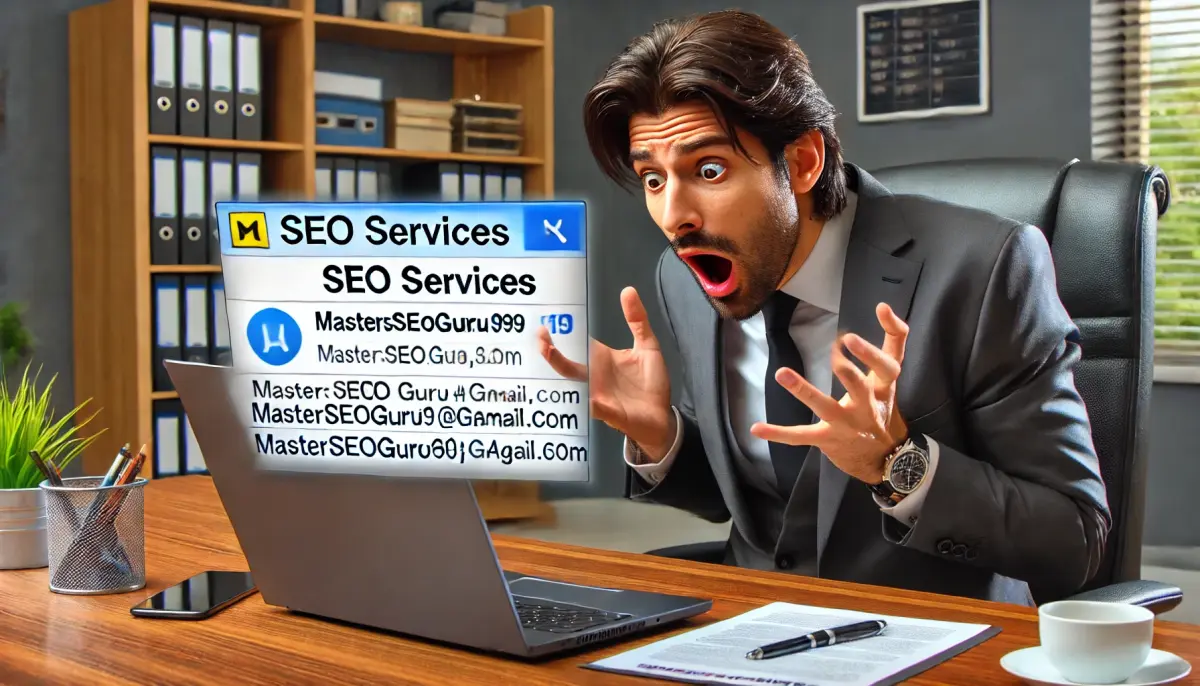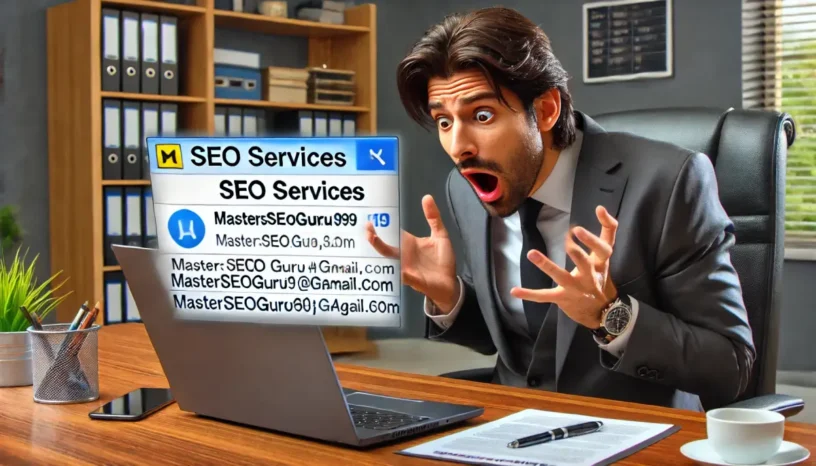We’ve all been there. You open your inbox, scroll past the usual junk, and then you see it: a message from “Justin Bieber.” You blink, confused. Did the Justin Bieber just email you an offer to boost your SEO rankings? Spoiler alert: no, he didn’t. What you’re looking at is the hallmark of unprofessionalism at its finest—an SEO “expert” who thinks posing as a pop star is a great marketing strategy.

It’s time to call this nonsense out and shine a spotlight on what professional communication really looks like. Here’s a guide to help you spot these red flags and ensure your own outreach is polished, professional, and—most importantly—effective. Especially considering some of the garbage that hits my email inbox day after day.
1. The Gmail Graveyard
Let’s just get this out of the way: if you’re running a business, and your email ends with @gmail.com, @yahoo.com, or heaven forbid, @hotmail.com, it’s time to level up.
You’re asking people to trust you with their SEO – one of the most important aspects of online business. At the same time, you can’t even be bothered to secure a professional domain? Not a good look. If you’re serious about your reputation, get yourself a custom domain and an email to match. Imagine receiving an email from info@TopRankPro versus masterSEOguru69@gmail. Who are you more likely to trust? Yeah, I thought so.
2. Your Email Alias Isn’t a Costume Party
If you’re pretending to be “Martin Garrix” in your email alias, you should probably switch careers and try out for a talent show instead. Using someone else’s name (especially a celebrity’s) makes you look untrustworthy and, frankly, ridiculous. And no one wants to hand over their SEO strategy to someone who thinks posing as a DJ is the secret to professional success.

PS: These are actual emails I received in the last week.
Pro tip: Use your real name. Better yet, use an alias that’s tied to your brand. If you’ve got a domain, go ahead and use something like yourname@yourbusiness.com. That’s how you establish trust, credibility, and professionalism in one simple step.
3. Build a Blog and Show Off (The Right Way)
Look, if you claim to be an off-page SEO expert, you’d better have something to show for it. Sending out cold emails without any visible proof of your skills is like trying to sell a car without letting people see it. Where’s your website? Where’s your blog? Where’s the content that shows you actually know what you’re talking about?
Get a website. Seriously. Write a blog that highlights your SEO strategies, successes, and tips. This is your portfolio. When people see your well-maintained, optimized site, they’ll trust that you can do the same for them. And please, for the love of all things digital, avoid mass emails with no personal touch. We’re in 2024, not 1999. Sending the same bland email to 500 people will only get you sent to the spam folder faster than you can say “unsubscribe.”
4. The Mass Email Epidemic
Let’s talk about mass emailing, which is still, somehow, the go-to strategy for so many “experts.” Newsflash: no one likes mass emails. Nothing screams “I’m too lazy to care” like blasting a generic message to a huge list of people who didn’t ask for it. If you’re serious about off-page SEO, you need to put in the work and make your outreach targeted, personalized, and thoughtful.
Not only do mass emails reek of desperation, but they also damage your credibility. Real professionals take the time to research their prospects, craft personalized pitches, and offer real value. So, if you’re still using the “spray and pray” method, it’s time to evolve—or get out of the game.
5. Choose a Professional Domain Name, Not a Joke
While we’re on the topic of domain names, don’t think you can slap together a random string of words and call it a day. Your domain name should reflect your business and your brand, and here’s the kicker: your professionalism. No matter if you’re a content writer, an SEO professional or a social media influencer, if your domain looks like it belongs on a spammy pop-up ad from the early 2000s, rethink it.
Also, avoid hyphens, numbers, and anything that could be confusing. A clean, straightforward domain name tells your audience you mean business. If your domain looks like a CAPTCHA challenge, people are going to assume your SEO skills are just as chaotic.
The Bottom Line: Professionalism Matters More Than Ever – Especially In Email
Here’s the thing: in a digital landscape flooded with so-called “experts,” professionalism is the one thing that can set you apart. Your email address, alias, and outreach strategy are all reflections of who you are as a business. And if you’re trying to pass yourself off as Justin Bieber, you’re not fooling anyone—you’re just embarrassing yourself.
So, next time you fire off an email to a potential client, take a second and ask yourself: is this professional? Does it reflect the kind of business I’m trying to run? If the answer is no, step back, rethink, and put in the effort to do it right. Because in this world, perception is everything—and you only get one chance to make a first impression.
Your Next Step
It’s time to clean up your act and take your outreach seriously. Get a professional domain, set up an email that doesn’t make you look like a fanboy, and stop mass emailing like it’s going out of style. Because, well, it already did. Take the time to personalize your communication and create a professional image that reflects the expert you claim to be.
Remember, your inbox says a lot about you. Make sure it’s saying the right thing.





Leave a Reply